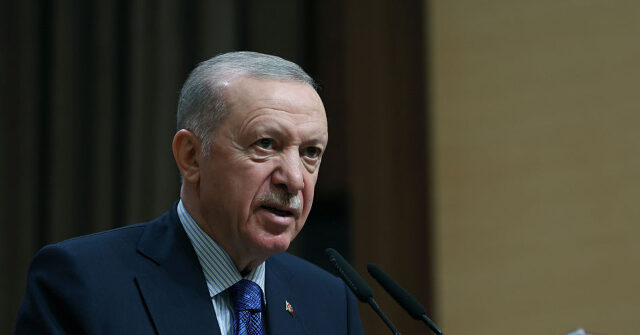Turkish President Recep Tayyip Erdogan on Wednesday brushed aside the demands of Syrian Kurds for partial autonomy under a decentralized Syrian government as “nothing more than a dream.” The junta currently in control of Damascus was also unreceptive to Kurdish ambitions for independence.
“The issue of a federal structure is nothing more than a raw dream. It has no place in the reality of Syria,” Erdogan sneered to reporters while flying back to Ankara from a summit with the Italian government in Rome.
Erdogan advised the Kurds “not to dream of a federal structure or make decisions that will threaten the region, but rather take steps that will serve the stability of the region.”
“We will not allow any forced structure right beyond our borders other than a unified Syria,” he declared.
The Turkish president was responding to a meeting between Kurdish political groups from Syria, Iraq, and Turkey on Saturday. The conference produced a joint declaration calling for “a just solution to the Kurdish issue in Syria as a decentralized democratic state.”
The Kurds said such an arrangement would contribute to “building a new Syria that accommodates all its people without exclusion or marginalization of any of its components, away from unilateral domination in thought and practice.”
“Failure to resolve the Kurdish issue in Syria will lead to instability, and rights, democracy, and justice will be rendered meaningless in Syria’s future. Rather, oppression and tyranny will be the defining characteristic of that future,” warned one of the Kurdish officials who participated in the conference.
What the Kurds were saying, in essence, is that they do not wish to be ruled by the jihadi military government that seized power in Damascus after overthrowing dictator Bashar al-Assad in December.
The head of that supposedly temporary government, Ahmed al-Sharaa, is a former officer of al-Qaeda, and the militant group he commands, Hayat Tahrir al-Sham (HTS), began as al-Qaeda’s franchise in Syria.
Sharaa claims he and his organization have turned over a new leaf and wish to govern Syria in a responsible and inclusive manner. The Kurdish conference on Saturday quoted Sharaa’s own promise to establish an “inclusive transitional government that would reflect Syria’s diversity” in its call for autonomy in the northeastern territory Kurds call “Rojava.”
Sharaa rejected that demand on Sunday, denouncing the notion of decentralized government as a threat to national unity.
“We clearly reject any attempt to impose a partition or create separatist cantons under the terms of federalism or self-autonomy without a national consensus. The unity of Syrian territory and its people is a red line,” Sharaa’s office said.
The government in Damascus reminded the Kurdish-led, U.S.-backed Syrian Democratic Forces (SDF) that they signed a deal in March to put all armed forces under the command of the central government, integrate with the national bureaucracy, and help to subdue the last remnants of pro-Assad forces in Syria.
Sharaa wants unified power, while Erdogan sees every Kurd with a gun as a threat to Turkish national security. Turkey has long maintained the U.S.-supported Kurdish militia, the YPG, is nothing but a wing of the Kurdistan Workers Party (PKK), a violent Kurdish separatist organization in Turkey. Erdogan’s government has conducted several incursions into Syria, and allied itself with some questionable Islamist forces among the Syrian rebellion, to drive the Kurds away from Turkey’s border.
Turkey has declared strong support for Sharaa’s government. Some of that enthusiastic support is premised on Sharaa bringing the YPG, SDF, and other Kurdish armed groups under control so Turkey feels safer.
The Kurds, like many Western leaders, have viewed Sharaa’s promises of unity and tolerance with suspicion, and the SDF has expressed reluctance to break down its independent command structure, even if it agrees to support the government in Damascus.
The SDF continues to fight skirmishes with Turkey’s militia allies in Syria, and Turkey continues to attack Kurdish positions in northeastern Syria, even after the PKK declared a ceasefire with Turkey at the beginning of March.
Kurds, and members of other Syrian minority groups, told the New York Times (NYT) on Tuesday that they still do not trust the government in Damascus, especially since it has become so friendly with Turkey.
“Al-Sharaa and the new government want to control all of Syria. And of course they are dreaming about controlling all of our areas. But it’s very difficult,” Kurdish politician Badran Kurdi told the NYT.
Read the full article here
